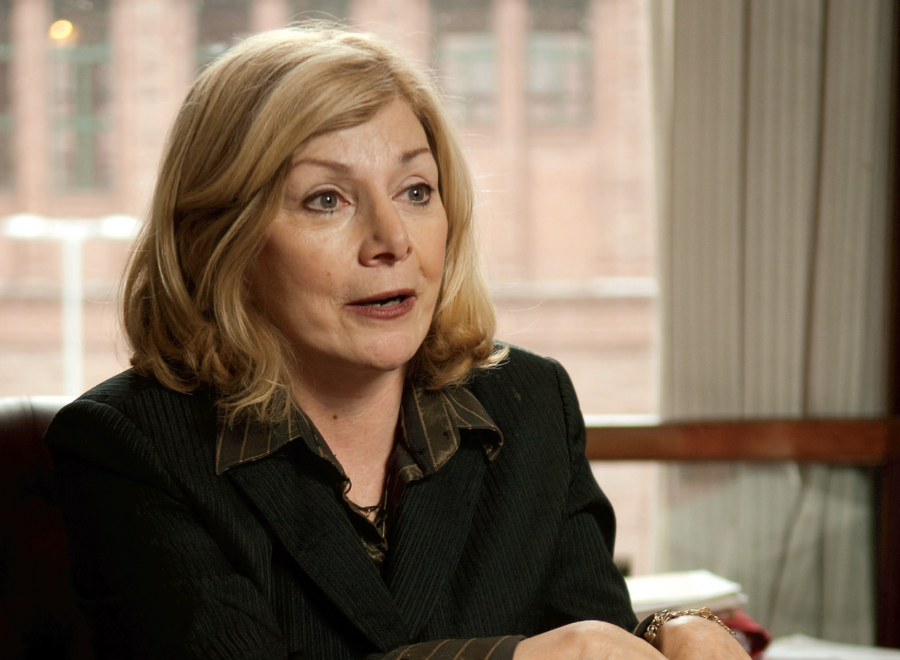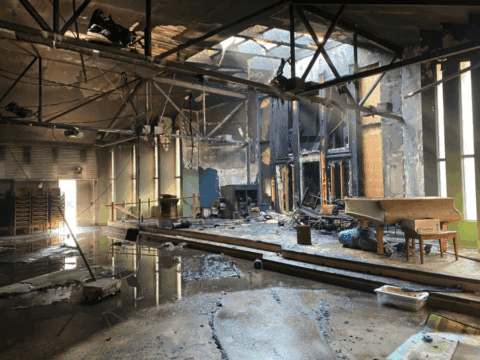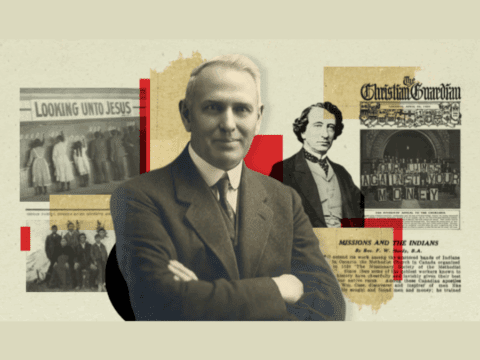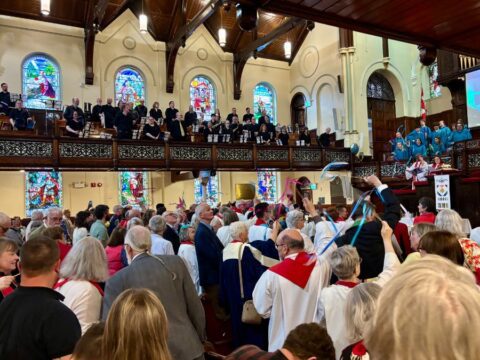Cheri DiNovo is an Ontario MPP, the author of Qu(e)erying Evangelism and a United Church minister. She believes the denomination has lost its political edge, and sat down with Ken Gallinger to explain how it happened.
KEN GALLINGER: You had a remarkable pastoral ministry at Emmanuel-Howard Park United in Toronto: two services a Sunday, full of kids and adults, gays and straights, rich and poor, new Canadians and old. Then you walked away for a life in politics. Why?
CHERI DINOVO: I felt that I had done what I could from the pulpit, and that if I wanted to make a significant difference in the lives of those who worship there, I was going to have to move to something a little larger. I saw the endemic problems of homelessness, poverty, hunger, racism, homophobia and sexism — and it’s not changing very much. In a very real way, we’re going backwards in terms of poverty, hunger and housing.
KG: Was there one defining moment when you knew this was something you had to do?
CD: I saw a family living in a car parking lot. It’s difficult to witness that, beat your head against the wall dealing with politicians to get something done and see very little uptake. So I thought coming to Queen’s Park might give me a larger voice and make a difference.
KG: What’s the verdict? Has it been worth it?
CD: There have been a considerable number of successes. The greatest was that I entered a bill to raise the minimum wage in Ontario to $10 an hour. We still haven’t got it, but we did get a raise of 28 percent for a million of the poorest people. I couldn’t have done that from the pulpit, so that was worth the price of admission.
KG: But I would assume there are also frustrations…
CD: I call this place, affectionately, “the den of thieves.” I have never worked in a place that’s so patriarchal. It makes the church look like a feminist utopia. Politicians work extremely hard — harder than almost anybody — so it’s not about that. It’s about the lack of trust and ethicality. I’ve never worked in a place where you can safely say you can’t trust anybody, and actually, literally mean that. That’s a very soul-destroying atmosphere. What these places need — the House of Commons, provincial legislatures and so on — is spiritual help. And it’s not forthcoming.
I feel very sorry for people here, and I wonder: what could one do pastorally for people in a place like this?
KG: But what about the United Church — your church? Has it provided care in any significant way?
CD: My husband and I church shopped. We went to different churches every Sunday, regardless of denomination. We walked unannounced into Humbercrest United, and what sold us was that Rev. Susanne VanderLugt welcomed visitors and especially singled us out. We were in the middle of a smear campaign; we were living in hell. And Susanne said, “Cheri, I want to welcome you and tell you that this congregation has been praying for you.” Whew! I get teary when I say that now. This is how we found our church home. It was the thought that, independent of partisanship, these people had been praying for us.
KG: What about the role of the churches in advocating for justice and social change? Looking at that from the inside out — are they effective?
CD: Sadly, the United Church has not been present in recent political life the way we were famous for being. There was a time when the prime minister would call up the moderator and ask “his” opinion on issues — and he did so for a reason. The voice of the moderator represented not only a huge constituency, but also some sort of ethical stance. That doesn’t happen anymore, stupidly on both sides. I don’t understand why the United Church isn’t speaking vociferously to power and at power.
KG: I’m sure you have some insight. What’s that about?
CD: The United Church suffers from low self-esteem. We don’t think our voice is important, and that has to change. Because the voice of the United Church needs to be heard by politicians, and the fact that it isn’t available does a disservice both to the political representatives and to the people they serve.
KG: Do other churches do a better job? Is there an example of how it should work?
CD: The Anglicans decided to make housing their issue in this area. Colin Johnson, their bishop, came and lobbied every caucus. I suggested they make it an issue at all-candidates meetings, and they did. In every riding across this province, the Anglicans hosted all-candidates meetings about housing; people showed up, listened and took it seriously. That’s being proactive. The Catholics are here all the time on social issues. The Evangelicals provide pastoral care — these are ways faith bodies make their presence felt.
KG: What do your colleagues in the legislature think of the United Church?
CD: Most don’t know what it stands for. It’s not the social justice giant it once was. Most folks see the Roman Catholics as the giant. Their Council of Bishops was far faster to endorse my minimum wage bill than the United Church. The Anglicans endorsed it. And the United Church eventually endorsed it, but way after the fact — after the government was already onside.
KG: So tell me, what the hell happened to us?
CD: Our internal struggles depleted us. We began to look inside rather than outside. Fear incapacitates. Some aspects of the church have been very frightened of losing status, and you always bring about what you fear. It’s a spiritual truism. But we still have a lot of people, a lot of money and a lot of power. By contrast, the Anglicans are really struggling, but they’re still active, still vocal about issues. We’re not suffering in the same way, so we could speak out. Why don’t we? [Sighs] Navel gazing! I have been blessed by The United Church of Canada. I believe it is the greatest expression of the Christian faith in Canada. Why are we not heralding that fact?
KG: In your book, Qu(e)erying Evangelism, you argue that the church needs queer people as much as queer people need the church. Explain.
CD: Not just “queer” in the sense of sexually queer, but any people who experience themselves to be on the margins of society. Every good minister knows who those marginalized people are in their community — or they should find out. In my congregation, the most vulnerable were the queer sexually, the trans folk. The call upon all congregations is to minister to these people. That’s where our life, our soul is to be found.
KG: But institutionally, those people suck you dry. They always need something! they draw upon your energy, your calendar, your life.
CD: I beg to differ. Ask most ministers: who takes the majority of your time and energy? Who are the highest-needs congregants? It’s not the queer, not the marginalized — they’re so beaten down they don’t even know they can ask for help. No! It’s the middle class — especially the upper middle class. The committee people. The church Council people, with all their petty squabbles, are used to having their voices heard and believe their voices are the most important. Those are the ones who cost time and suck you dry.
KG: Some day, this political chapter in your life will end. Will you return to pastoral ministry?
CD: I miss ministry. Certainly, in some shape or form, I’ll go back. It’s a very human, very good job. It’s not easy. It’s trying. But you can rest your head easily on the pillow at night, knowing you’re doing something profoundly ethical.
You’re changing the world, one person at a time. I miss that. Those who are in ministry are among the most blessed anywhere.
***
This story first appeared in The United Church Observer’s April 2010 issue with the title “‘My colleagues in the legislature don’t know what the United Church stands for.’”














